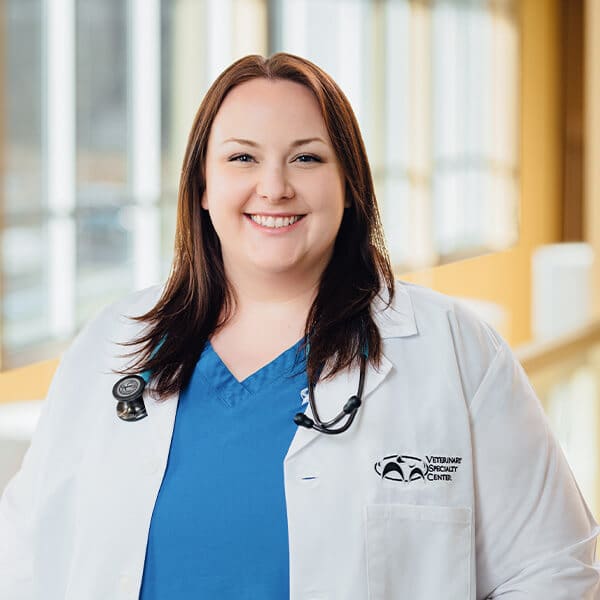Lynn Little DVM, MS, DACVIM
Internal Medicine

DVM
The Ohio State College of Veterinary Medicine
Internship
Tufts University College of Veterinary Medicine
Internship
Western College of Veterinary Medicine at Saskatchewan
Residency
Purdue University College of Veterinary Medicine
Certification
Board Certified by the American College of Veterinary Internal Medicine
“If you do the work, you can really puzzle through some things that don’t always make sense, and that can be really rewarding when you find the right answer.”
Dr. Lynn Little found a passion for medicine at a young age, which is not surprising since she came from a long line of medical professionals. What set her apart was her love for animals coupled with a passion to help them. She is proudly the first veterinarian in her family and Dr. Little says her desire to be a vet was so strong because “animals do not always have a voice, so it is more of a puzzle to figure out.”
She also values how important animals are to their families and that she not only gets to help pets but the people who love them, too.
Get to Know the Expertise, Skill, and Heart Behind VSC
How did you become interested in internal medicine?
My journey into veterinary internal medicine started during my time in general practice. While working as both a general practitioner and an emergency veterinarian, I discovered my passion for emergency and critical care medicine. I especially enjoyed helping pet owners navigate the overwhelming decisions involved in caring for a critically ill pet. During my Emergency and Critical Care internship at Tufts University, I realized that the cases I found most rewarding were those involving internal medicine. That’s when I decided to pursue a specialty in internal medicine, which allows me to focus on the complex and often challenging conditions that require deep knowledge and careful long-term management.
What are some of the biggest challenges in your area of expertise?
One of the biggest challenges in internal medicine is diagnosing and managing patients with complex or rare conditions. Often, symptoms can be subtle or nonspecific, and it takes a lot of time and patience to piece everything together. Another challenge is communication—especially when the diagnosis is difficult or the prognosis uncertain. It’s incredibly important to have open, honest conversations with pet owners, helping them understand what their pet is going through while maintaining hope. I always strive to provide clarity and compassion, ensuring that owners are involved in decision-making while we work together to provide the best care possible for their pets.
Is there a particular case that inspires or motivates you?
One of the cases that has stayed with me was a 7-year-old Australian Shepherd who came in with severe ivermectin toxicity after ingesting a large amount of the medication. The dog was unconscious and unable to breathe on her own, but the veterinary team and I were committed to doing everything possible to save her. After two weeks of intensive care, including being placed on a ventilator, the dog started to improve and eventually made a full recovery. That case really showed me the power of teamwork, advanced medicine, and a committed family, and it reinforced my belief that even in the most critical situations, remarkable things can happen.
What do you like to do outside of work?
When I’m not working with my amazing patients, I enjoy spending time outdoors. I love hiking with my dog, cycling, and traveling to new places. When I’m feeling more indoorsy, I enjoy reading, playing board games or cards, watching movies, and trying out craft projects. I’m definitely a dog person, but I also feel that my life isn’t complete without cats. I have a special place in my heart for feline patients, as I think they are often misunderstood, and I love finding ways to make their veterinary experience as comfortable and stress-free as possible.
Dr. Little’s Professional Interests
My professional interests include gastroenterology, immune-mediated diseases, endocrinology, and feline medicine. I’m passionate about working closely with other specialists and collaborating to provide the best care for each patient, as every case is unique. I also enjoy being involved in research, having worked on studies examining urinary tract infections in dogs and refining urine collection techniques to improve diagnostic accuracy. I feel incredibly lucky to be part of the collaborative team at Veterinary Specialty Center, where we can offer comprehensive care that is tailored to the individual needs of every patient.
